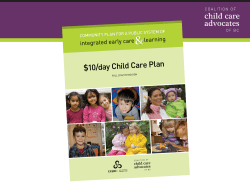
Fact Sheet: Income Splitting vs. Child Care
Fact Sheet: Income splitting vs Childcare Study after study shows that public spending on child care should be a top priority. The wide-spread and long-lasting economic, social, and health benefits for children, families, and society far outweighs the costs. However, Canada is last among its peer countries on public spending on child care. Despite all the evidence, the federal Conservative government persists on ineffective high-cost proposals such as income-splitting and the Universal Child Care Benefit (UCCB). There is a dire shortage of regulated child care for families across Canada. Canadians are offered a small array of boutique items that cost more and deliver less than a direct investment in a universal child care program would. Such a program would present parents with better options. The Harper Conservative government has made good on an election pledge that they would allow couples with children under 18 to split up to $50,000 of their income each year up to a maximum of benefit of $2,000. The Canadian Centre for Policy Alternatives (CCPA) report, Time To Grow up: Family Policies for the Way We Live Now, shows Canadians that the Conservative income splitting to families with children under 18 would provide no benefit to 89 per cent of all families. Meanwhile the cost to the federal government would be $2 billion in 2015. Despite the substantial cost, the benefits are quite concentrated and exclude most families. It benefits about 2 million households, or 15 per cent of the Canadian total. Middle and middle-high income households benefit most. According to the (Parliamentary Budget Officer (PBO) The UCCB will provide $160 a month per child until they are six years of age and $60 a month for each child between ages six and seventeen. It delivers little to families in terms of its stated goal to provide choice in child care arrangements. The benefit does absolutely nothing to address the pressing crisis faced by most families in having available affordable child care. Source of graphic: pressprogress.ca The combined cost of income-splitting that benefits the rich and child benefit cheques that don’t buy quality child care, the missed opportunity costs are huge. Canada could accomplish so much more. Child care is perhaps the most significant lever available to governments seeking to help parents balance work and family life. If Canadian governments are concerned about supporting families with children, they would support the growth of quality affordable child care spaces. It is time to rethink child care. RethinkChildcare.ca
© Copyright 2025





















